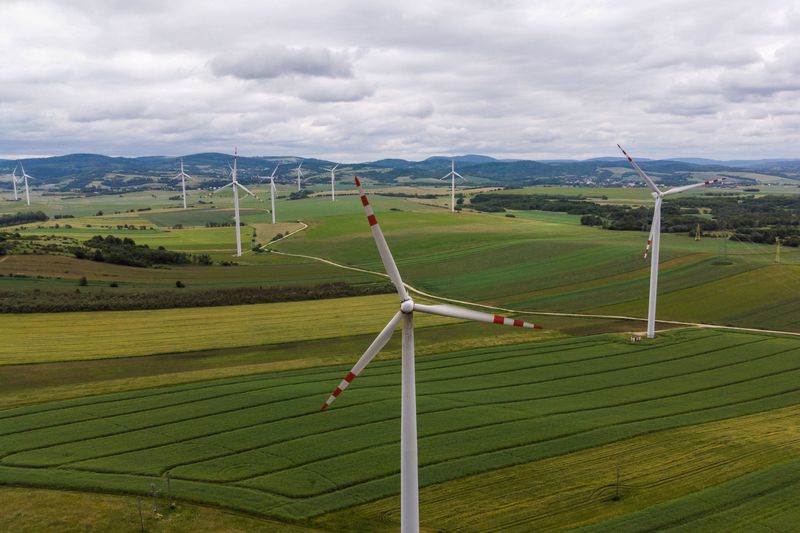Analysis-Companies buy into suppliers to secure deliveries, hit green targets
2023.07.21 01:28

© Reuters. FILE PHOTO: A view of power-generating windmill turbines owned by Ikea Retail amid wheat fields near Rymanow, Poland, June 12, 2023. REUTERS/Kuba Stezycki/
2/2
By Clara Denina and Sarah McFarlane
LONDON (Reuters) – Major brands, including the investment arm of the IKEA group, are following automakers’ lead in snapping up stakes in suppliers of raw materials and energy, seeking greater control over their production to meet emissions targets and limit disruptions.
After global supply chains buckled under pressure from the coronavirus pandemic and the war in Ukraine, a wider array of companies are embracing vertical integration and investing in suppliers of renewable energy, metals, agricultural products and many more.
In the past six months, more than $4 billion was spent by firms investing in their supply chains across industries including food, batteries, chemicals, autos, mining, and waste and recycling, data from market intelligence platform Climate Tech VC shows.
While global supply networks recover from the pandemic shock, fresh impetus is coming from tougher environmental standards, which drive companies to invest in new technologies to reduce their and their suppliers’ emissions.
“We are in the fastest transition in our industry ever… We are sending clear signals to the innovators in our supply chain that we will support them,” said Andreas Follér, head of sustainability at truck maker Scania.
“So in battery, steel, aluminum and cast iron we will only source green materials and technologies by 2030,” Foller told Reuters.
Efforts to reduce reliance on China and Russia also play a role, even though for many buying into their supply chains could be a big and costly leap into the unknown.
“The events of the last three years have taught businesses a lot about the fragility of supply chains. Vertical integration is first and foremost a strategy that minimizes risk of disruptions,” said Rebecca Campbell a partner at White & Case law firm that advises companies on such deals.
Export controls Beijing is due to impose next month on
gallium and germanium, used in the semiconductor and defence industries, are a case in point.
China’s move took end-users in multiple sectors by surprise, with some fearing more curbs could follow from the world’s largest producer of many raw materials.
RETAILER-TURNED-SHOPPER
Although not a new phenomenon, control and ownership of key aspects of production have made a comeback since the pandemic’s outbreak in 2020, with global automakers, including GM and Stellantis, under added pressure to go electric fast, investing in lithium, and nickel mines.
Other sectors, including retail, are also shopping around.
The IMAS Foundation, the investment arm of furniture retailer IKEA’s owner, spent over 1 billion euros ($1.12 billion) on “decarbonisation assets and strategies”, including stakes in steelmaker H2 Green Steel (H2GS) and battery manufacturer Northvolt.
The foundation told Reuters it would also consider further investments in producers of steel, construction and green aluminium produced with hydropower or from recycled materials.
“In times of de-globalisation and higher geopolitical risks, the security of supply has become more important,” it said in an email.
Both H2GS, which is building a hydrogen facility powered by renewable energy, and Northvolt are based in Sweden.
Scania’s Foller told Reuters that the Swedish truck maker, which is also an investor in H2GS and Northvolt, was deliberately seeking some investments located closer to its home base to support its efforts to cut carbon emissions.
Scania said that following its 10 million euro ($11.15 million) seed investment in H2GS in 2021, it has entered a steel supply agreement from 2027.
In the aviation industry, airlines have started to invest in fuel production, concerned about insufficient supply of biofuels which several countries, including Norway, Germany, Indonesia and Britain, will require to be part of jet fuel mix.
RISKY CYCLES
United Airlines in March invested in an algae-based fuel producer, Britain’s Jet2 has invested in a plant converting landfill waste into fuel, while Hungary’s Wizz Air invested in a Bristol-based company converting sewage sludge into fuel.
“They’re still taking risk on supply in a business they are not experts in,” said Maybel Saleh, EMEA managing director for aviation at Citi.
Supply chain investments are inherently risky, partly due to the cyclical nature of commodity markets, and might only work as temporarily to resolve bottlenecks and polish environmental credentials, say auditors and lawyers who assist companies on such transactions.
“Margins rise and crash with volatile prices,” White & Case’s Campbell said. “Equity investments that appeared sage in June 2023 may look foolish on a corporate balance sheet in 12 months’ time.”
While companies will keep investing in their suppliers in the short to medium term, the market will eventually reach saturation, said Jon Chadwick, global energy transition lead at PricewaterhouseCoopers.
“That’s when the shareholder pressure will come back to say: ‘we’re not getting the returns on these, how do we start to divest?'”
($1 = 0.8967 euros)








